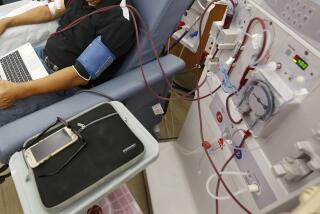FDA to ease longtime ban on blood donations from gay men

For the first time since the early days of the AIDS epidemic, gay and bisexual men will be permitted to donate blood under rules set for release next year by the Food and Drug Administration.
Officials at the federal agency said Tuesday that they would relax their long-standing ban on donations from men who have had sex with another man at least once since 1977. Instead, these men will be allowed to roll up their sleeves if they are free of HIV and have not engaged in homosexual activity for at least one year.
Though less visible than the struggle to allow gays to serve openly in the military or the effort to legalize same-sex marriage, the campaign to end the 31-year ban on blood donation has become an important cause for those who see it as homophobic and unfair. The FDA was caught between the civil rights of prospective gay donors and its mandate to protect public health.
The FDA’s decision came a few weeks after a panel of independent experts concluded that imposing a waiting period, or deferral, of one year on those donors would not endanger the safety of the nation’s supply of donated blood. That panel relied heavily on the experience of Australia, which in 2000 adopted a one-year deferral policy for men who have had sex with men.
Sweden, Britain and Japan have also altered their lifetime bans on such donors and adopted a one-year deferral policy.
Dr. Peter W. Marks, deputy director of the FDA’s Center for Biologics Evaluation and Research, said “a variety of epidemiological data” and statistical modeling gave the agency confidence that the relaxed strictures would not increase the risk that blood supplies would be tainted with HIV or other viruses transmitted through sex, including syphilis and hepatitis B and C, he said.
Once implemented, the new rules will make about half of the men who are now turned away from blood donation centers because of a history of gay sex eligible to donate for the first time since 1983.
With the new rules, the FDA aims to treat men who have had sex with men the same way as members of other groups that are at increased risk of having HIV and other sexually transmitted diseases. Currently, people who have had sex with an HIV-infected partner, an intravenous drug user or a sex worker may donate blood only if a year has passed since their last encounter. Visitors to certain parts of Africa are also deferred as blood donors for at least a year after returning to the United States.
Gay rights activists greeted the FDA announcement with a mix of praise and criticism.
“This is a huge step in the right direction and we embrace this initial change,” said Ryan James Yezak, founder and executive director of the National Gay Blood Drive in Los Angeles. “It does not go far enough, but we support it.”
Michael Weinstein, president of the AIDS Healthcare Foundation in Los Angeles, said the updated policy was “well intentioned” but that improved screening techniques should make it possible for the FDA to focus on “individual risk factors and not simply target an entire category or population of people for exclusion or restriction from the donor pool.”
The foundation said the policy would continue to “stigmatize gay men” and other men who have sex with men by “reinforcing the idea that HIV is a ‘gay’ disease.” And for many men, the strictures of the new policy “will in essence … function as a de facto lifetime ban”
Criticism also came from the Family Research Council, which had argued to the FDA scientific advisory panel that the ban should remain in place.
Peter Sprigg, a senior fellow for policy studies at the Washington-based group, accused the agency of ignoring panel members who were “clearly reluctant” to approve changes and “rushing to the politically correct decision demanded by homosexual activist groups.”
“Research presented to the committee confirmed the dramatically elevated risk of HIV infection among men who have sex with men,” Sprigg said. “This risk certainly justifies the highest level of vigilance, and political and social concerns must not be allowed to trump the public health.”
The advisory panel’s report noted that although men who have sex with men make up an estimated 7% of the population, in 2010 they accounted for 78% of the newly diagnosed cases of HIV.
Marks said the FDA planned to issue draft guidance on the matter early in 2015, invite public comment for several months and issue a final rule “as expeditiously as possible.”
“This won’t be an immediate change,” he cautioned.
Currently, about 9.5 million donors give blood 15.7 million times each year in the United States, and 5 million patients receive the resulting blood products annually.
A 2010 study published by the Williams Institute at the UCLA School of Law estimated that a 12-month deferral policy for men who have had sex with men would result in more than 53,000 additional people adding nearly 90,000 pints of blood to the nation’s supply each year.
The FDA regulates how blood donations are collected and how blood is transfused, and the Centers for Disease Control and Prevention conducts investigations and surveillance to assure the safety of donated blood. The FDA said Tuesday that the National Heart, Lung and Blood Institute had also begun to implement a blood surveillance system to make sure the nation’s blood supply remains safe after the rules are relaxed.
Marks cited Red Cross data showing that each year about 1 in 1.5 million units of blood screened for contamination is found to carry HIV. That oversight is most likely the result of donors who have contracted HIV within the preceding three months, too recent for their viral load to register on screening tests.
If a prospective blood donor is asked to wait a minimum of one year after his last sexual encounter with another male, the deferral period might be as much as four times longer than necessary.
In Australia, that has already prompted officials to propose a shorter waiting period of six months. Groups in the U.S. such as the National Gay Blood Drive expressed hope that the FDA, in its future assessments of the policy, would follow suit.
“We don’t want to take away from how huge this recommendation is, but we encourage the FDA to continue this effort,” Yezak said.
But Marks said any further change would have to wait for more research.
“At this time the scientific evidence for a deferral period shorter than [one year] is not compelling,” he said.
Marks acknowledged that the FDA had considered a shorter waiting period for gay men in committed relationships, but ultimately rejected such a change. Prospective blood donors may say they’re in a monogamous relationship, Marks said, but they can’t necessarily guarantee the monogamous behavior of a partner. That possibility makes “self-reported monogamy as an indicator of HIV risk” unreliable, he said.
Twitter: @LATMelissaHealy







